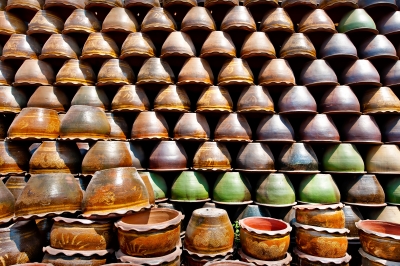
In a previous post, I said that if we want to involve the whole parish in the RCIA process, we have to stop making scholars and start making disciples.
This is not easy. Our entire formation system is designed to create scholars. We place a heavy emphasis on “knowing the faith,” by which we usually mean knowing the doctrines of the faith. I think it’s great to know the doctrines of the faith. But our job is not to train theologians. Our job is to train people how to live as Christians.
In another post, I said that catechesis is an art. And now I want to say that Christian discipleship is also an art. Disciples who have mastered the art form train future disciples and less-skilled disciples in the art of Christian living.
How does an artist train an artist?
No one is born an artist. Artists are made. Tertullian said the same thing about disciples. He said, “Christians are made, not born.” So how do we make Christians? We do it the same we we make artists.
I once visited a pottery studio, and I met two apprentices. I asked them about the process for learning pottery. They said they come to the studio every day, and the master potter gives them a task. Their task the day I visited was to make 100 pots. I asked them what they did the day before. They made 100 pots. And the day after? 100 more pots. I asked them how long they would be making 100 pots a day. They said until the master potter decides that they are potters.
The apprentices were not yet potters. They looked and acted like potters, but they had not yet mastered the fundamentals of pottery.
How do we apply this to making disciples?
It is probably obvious that when I visited the pottery studio, I was an inquirer. The apprentices would be similar to catechumens. And the master potter would be the catechist. The studio itself, which served as a hub for the pottery community in that area of the country, would be the parish.
Here is something that may not be obvious. The main reason the studio exists is not to make pots. The studio exists to make potters. If all of us who are now potters make 100 pots a day—but we don’t make any new potters—pottery will die. Our pots may outlive us, but they will eventually break or get lost. The only thing that keeps pottery alive is the creation of new potters.
Likewise, the parish does not exist to teach doctrine. It exists to make disciples. It is the responsibility of every member of the parish to make disciples. And so the central focus of every activity in the parish and the central focus of every parishioner is the catechumenate, which is how we make disciples.
Five ways the RCIA matters for all of parish life
This is all laid out for us in the General Directory for Catechesis. I’ve paraphrased to make the point clearer, and you can see the original here: http://marker.to/sB8oy3.
- The catechumenate serves as a constant reminder to the whole parish of the vital importance of initiating new people into the community. The essential components of initiation are catechesis and the celebration of the initiation sacraments—baptism, confirmation, and Eucharist.
- The catechumenate is the responsibility of every member of the parish. This is a radical decentralization of the missionary activity of the church and requires every Christian to think of himself or herself as an equal partner in the work Jesus left us.
- The catechumenate is steeped in the mystery of Christ’s death and resurrection. Therefore everyone involved in the work of initiation must work hard to clearly reveal the paschal nature of our faith. The Easter Vigil is the source and inspiration for all catechesis.
- The catechumenate is also an initial starting point for inculturation. The Son of God became human in a concrete place and time in history. That is to say, Jesus had a culture. Therefore, we accept and celebrate the cultures of all those who seek to become members of our church. Different cultures hear the word of God in different ways, and it is our job to find ways of incorporating all those different styles of hearing into the catholicity of the church.
- Finally, we understand the catechumenate to be “a process of formation” (91). The catechumenate is not a textbook to be gotten through nor a series of meetings to attend nor a required number of service projects. It is a comprehensive formation, gradually accomplished in definite stages. It is marked and celebrated in “meaningful rites, symbols, biblical and liturgical signs” (91). Most of all, it is a formation handed on by us, the Christian faithful, the Body of Christ.
New evangelization—what it is really all about
There is a lot that is written about new evangelization these days, and honestly, I find it a bit confusing. But here is what I believe we mean by the term.
There are many, many people who are baptized, but who have never developed a relationship with Jesus. If our parishes are primarily focused on reaching out to newcomers and making them into disciples, how can we pastorally care for the millions and millions of Catholics who simply do not live the faith and find little joy in their Christian heritage?
A whole-parish formation checklist
We do it by using the principle elements of the catechumenate. It is the shape and structure of the catechumenate that should inspire the catechesis we provide for the faithful and the fallen-away Christians (GDC 59). When we use “evangelization techniques” on the already-evangelized in order to awaken their faith, we can call that work a new evangelization. We can use these central elements of ordinary evangelization—the catechumenate—as a kind of checklist for formation.
- Do our catechetical and formation efforts focus the parish toward initiation as the central mission of the parish?
- Do our catechetical and formation efforts empower parishioners to take up their cross of responsibility for the success of the parish mission to unbelievers?
- Do our catechetical and formation efforts focus passionately on revealing the paschal mystery that we celebrate in its fullness in the Easter Vigil every year?
- Do our catechetical and formation efforts instill in your parishioners a respect for and a joy over the various cultures in your community and neighboring communities?
- Finally, do our catechetical and formation efforts make up a comprehensive, gradual formation process that takes place in well-marked stages, celebrated in the signs and symbols of the liturgy?
Have some faith
If we re-vision our parishes, and move toward the comprehensive formation process outlined in the General Directory for Catechesis and the Rite of Christian Initiation of Adults — and that’s all we did — we would experience a flood of inquirers responding to the great hope offered by the Risen Christ to all who seek him. And we would be completely blown away by the renewal of the millions and millions of Catholics who have let their faith grow cold.
All we have to do is focus on making disciples instead of scholars. And have some faith.









What an excellent article! It challenges us to do the work that is needed in our parishes to form disciples. Our annual staff retreat focused on this very issue. It is now up to us to be willing to change and let go of the “old” ways of doing business and be willing to allow the Spirit to “create something new” in us. Thank you so much Nick.